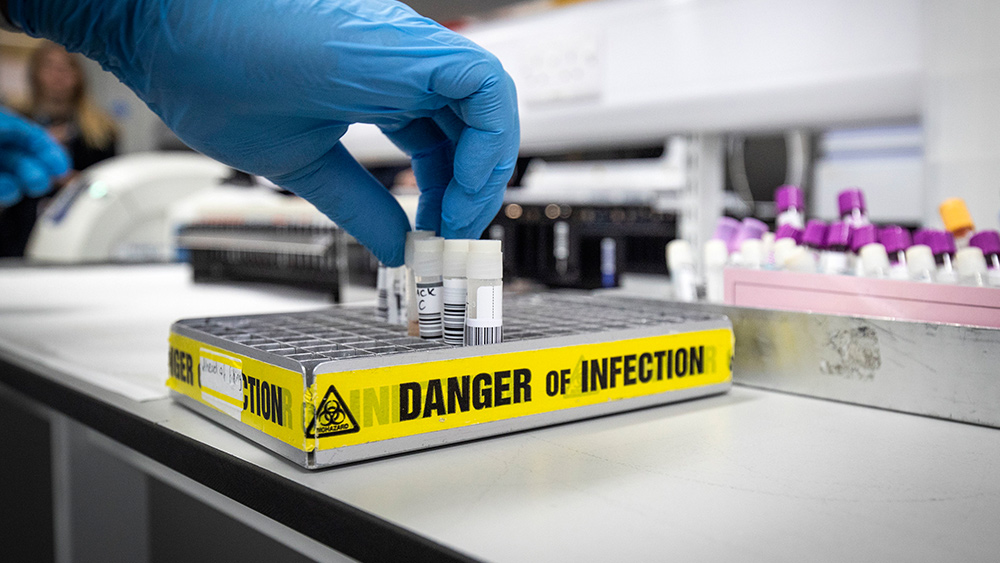
The prevalence of microplastics in the environment is well documented, along with their negative impacts on marine life. However, only a handful of studies have examined their potential health impacts on mammals.
This inspired Jaime Ross, a professor from the University of Rhode Island (URI), to conduct a study on the effects of microplastic exposure.
The study was published in the International Journal of Molecular Science.
Microplastics and brain health
Ross and her colleagues analyzed the neurobehavioral effects of, and inflammatory response to, microplastic exposure, as well as the accumulation of microplastics in tissues, including the brain.
Upon examining data from animal studies, the researchers discovered that the infiltration of microplastics is just as far-reaching in the body as it is in the environment. Microplastics exposure was also linked to behavioral changes, especially in older animal subjects. (Related: Report reveals recycling plastic releases toxic "chemical cocktail" into the environment.)
For the study, the researchers exposed young and old mice to different levels of microplastics via their drinking water for three weeks. The results showed that microplastic exposure induces behavioral changes and alterations in immune markers in liver and brain tissues.
After being exposed to microplastics, the research team noticed that the mice began to move and behave peculiarly, exhibiting behaviors similar to those caused by dementia in humans. The results were more profound among older mice.
Ross said this was "striking" because even though they didn't use high doses of microplastics, the exposure still caused significant changes in only a short period.
Experts still don't fully understand the life cycle of microplastics in the human body.
Ross said she and her fellow researchers aimed to answer the following questions in their study:
- As you age, does it make you more susceptible to systemic inflammation from microplastics?
- Can your body get rid of microplastics easily?
- Do your cells respond differently to these toxins?
Microplastics accumulate in all organs
To understand the physiological systems that may be contributing to the behavioral changes they observed in mice, the researchers analyzed how widespread the microplastic exposure was by dissecting several major tissues, such as the brain, gastrointestinal tract, heart, kidney, liver, lungs and spleen.
They found that the particles had started to bioaccumulate in every organ, including the brain, and even in bodily waste. Because the microplastics got inside the animals' bodies through their drinking water, Ross and her colleagues expected to find microplastics in the gastrointestinal tract as well as in the liver and kidneys.
Ross noted that the presence of microplastics in the heart and lungs indicates that they spread beyond the digestive system and potentially undergo systemic circulation. This is dangerous because the blood-brain barrier is supposed to be "difficult to permeate."
The blood-brain barrier is "a protective mechanism against viruses and bacteria," but microplastics were able to infiltrate it. The particles were found deep in the brain tissue. Brain infiltration by microplastics may cause a decrease in glial fibrillary acidic protein (GFAP), which supports many cell processes in the brain.
Ross warned that a decrease in GFAP is linked to the early stages of certain neurodegenerative diseases, such as Alzheimer's disease, and depression.
The researchers were also surprised to learn that microplastics could induce altered GFAP signaling.
Ross plans to continue investigate this further in future studies. "We want to understand how plastics may change the ability of the brain to maintain its homeostasis or how exposure may lead to neurological disorders and diseases, such as Alzheimer's disease," said Ross.
Tips to reduce exposure to microplastics
Microplastics are minuscule and they are everywhere, making it hard to avoid them.
Protect your brain health and overall well-being by following these tips on how to reduce your exposure to microplastics:
- Do not purchase ready-to-heat products such as boil-in-the-bag rice.
- Don't buy fruit sealed in plastic.
- Avoid heating anything in plastic.
- Avoid consuming food or beverages that have come into contact with plastic.
- Avoid food-grade nylon used for food packaging and as liners in slow cookers.
- If possible, drink filtered tap water over bottled water.
- When buying clothes or furnishings, choose more natural fabrics.
- If you're buying carpet, look for something made of wool, not polyester. While natural fibers are usually more expensive, you can save some money with second-hand carpets.
Avoid food like fruits and vegetables wrapped in plastic and drink filtered tap water to reduce your exposure to harmful microplastics.
Visit Microplastics.news to learn more about the many dangers of microplastics.
Watch the video below to learn more about a study on microplastics discovered in human blood.
This video is from the InfoWars channel on Brighteon.com.
More related stories:
Microplastics alter the shape of human lung cells, warn scientists.
Study: Plastic pollution in some lakes is WORSE than the most contaminated parts of the oceans.
Sources include:
Please contact us for more information.





















